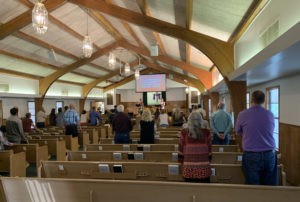It’s no secret that there’s bad blood between Christian complementarians and Beth Allison Barr. After all, her bestselling book, The Making of Biblical Womanhood, tears down the boys-only fort they’ve built in the church yard.
Yet the sticks and stones appeared to go to a new level Nov. 4 when the leading network of men promoting male headship in church and home published a piece that targeted the small Texas church where Barr’s husband serves as pastor. The crime? A statement on the church’s website that used the single word “Godself.”
And even though First Baptist Church of Elm Mott, Texas, quickly acknowledged the dispute over this small portion of their website and made an adjustment with an explanation, the Council on Biblical Manhood and Womanhood kept the illustration in the opinion piece written by Colin Smothers, executive director of the council. The illustration was, in fact, the point of the piece.
The Twitterverse — where important and arcane theological debates play out these days — continues to light up with outrage over what Barr’s defenders perceive as an attack on her husband’s church as a way to get back at her.

Beth Allison Barr
Barr, a history professor at Baylor University, acknowledged the slight with a tweet of her own that said “ministry just got harder today.”
In a second tweet, she said: “Going after me personally — attempting to discredit my narrative & historical expertise — was a cheap shot. Going after my husband’s small church was an even cheaper shot. Especially from folk who claim to stand for the gospel.”
And then later: “Seriously? What is wrong with y’all? I recommend you remove your target from my church and husband, as well as my orthodoxy because you will lose. You can disagree with my history; but you cannot slander my faith or the faith of the people in the church we serve.”
The accusation
The Smothers column addresses a favorite whipping boy of Christian conservatives, pronouns, specifically the use of “preferred pronouns” as advocated by those concerned about gender inclusion. Smothers immediately ties this phenomenon to “the ongoing LGBT revolution.”

Colin Smothers
To summarize a too-long diatribe, Smothers and his brothers don’t like the idea of “preferred pronouns” because this gives deference to individuals to determine how they want to be addressed — and because it denies the absolute binary they see embedded in creation by God himself (and they do mean “himself”).
Such individual free will on how to be addressed can become “parasitic” and “tyrannical,” he writes, and is “a species of surrender to intellectual colonization.”
And — you knew this was coming — the “debate over pronouns” has theological problems, he continues. “How we refer to ourselves affects and reflects our theology and vice versa, as it is God who made us male and female in his image. Recent conversations have made this explicit, and our doctrine of God now suffers because of the stupidity of the pronoun debate.”
Remember, the Council on Biblical Manhood and Womanhood believes — nay, demands — that God created two genders and that each gender has been given different but “complementary” roles in society. That’s why only men are allowed to be pastors and why any discussion of same-sex attraction or gender dysphoria are non-starters.
All this is part of the wind-up to get to the attack on Beth Allison Barr’s husband’s small church. There’s one more stop on the road, though.
Rebutting an RNS opinion piece along the way
About a third of the blog addresses and refutes an article published by Religion News Service by Mark Silk, professor of religion in public life at Trinity College and a contributing editor to RNS. And by the way, this article was published Sept. 29, five weeks ago.
Silk suggests that it would be helpful for Christians to speak of God in gender-neutral terms — a practice already widely adopted in many mainline and progressive Christian congregations. (In case you’re wondering, this also is a practice used by BNG, where our policy is to not to change biblical language such as “God the Father” but wherever possible to refer to the Godhead in gender-neutral ways. And yes, we still refer to Jesus as “he” because the Son of God came to us in a gendered form. On the third person of the Trinity, the Holy Spirit, we most often use either gender-neutral or feminine pronouns.)
What Silk wrote for RNS is this: “In contrast to human beings, it has long been accepted that God is not gendered, at least within the main Abrahamic theological tradition. A phrase such as ‘God the Father’ should be treated as a metaphor — and for those concerned about the embedded misogyny of the tradition, to say nothing of post-binary folks — a deeply problematic one.”
By now, you can see how such a statement would cause the folks at the Council on Biblical Manhood and Womanhood to fire back. This declaration undercuts their organization’s entire reason for being.
“Smothers contends that while liberals and progressives want to defer to personal preference for humans and their pronouns, they don’t offer God the same benefit.”
Smothers contends that while liberals and progressives want to defer to personal preference for humans and their pronouns, they don’t offer God the same benefit. He is certain — and cites chapter and verse — that God’s preferred pronouns are masculine. Always. Just read a traditional English translation of the Bible; there are hims and hes everywhere.
While it is true that in the original Hebrew and Greek — yes, I got that far in seminary — there are many instances where masculine pronouns are used or implied for God. But there are ample other instances where male translators historically have made male parts out of words that mean something more inclusive.
Does anyone remember the kerfuffle over the introduction of a “gender-inclusive” version of the New International Version of the Bible? The NIV translators and the publisher Zondervan wanted to come clean on the places where earlier translators at best had assumed male pronouns — or at worst inserted male pronouns — in the biblical text.
Guess who wasn’t happy about that new English version of God’s holy word? That’s right, the Council on Biblical Manhood and Womanhood.
Thus, in response to Silk’s RNS column, Smothers says he and the council must cry foul again because “God’s self-revelation in the Scriptures is unquestionably gendered. To say otherwise is to deny the authority of the Bible and cease to confess Christian orthodoxy which universally, throughout time and space, has worshiped God as Father, Son and Spirit.”
“Complementarians and Calvinists love to label anything they disagree with as against ‘orthodox’ Christianity or ‘antithetical to the gospel.’”
In case any of that dire warning sounds familiar, it should. Complementarians and Calvinists love to label anything they disagree with as against “orthodox” Christianity or “antithetical to the gospel.”
Finally, to the main point
All this was background to get to the zinger of the Smothers column, which was to use Beth Allison Barr’s husband’s small church as an illustration of radical feminism and the dangers of preferred pronouns. Which also provided the opportunity to link to Kevin DeYoung’s controversial rebuttal of Barr’s book via the council’s website.

Interior of First Baptist Church of Elm Mott, Texas.
Someone — whether Smothers or an unnamed accomplice — apparently had the time to comb through church websites to find examples of gender-neutral God-talk. Maybe they just went straight for the website of First Baptist of Elm Mott; it’s hard to say. However, scouring through every word of church websites is not a new tactic for conservative Southern Baptist TheoBros. They did the same thing with SBC President Ed Litton’s church website, seeking to discredit him after he was elected against their pre-ordained will.
The guardians of the gender galaxy found heresy buried in the “What We Believe” page of the Elm Mott church website. It said: “We value the Bible as the divinely inspired record of God’s revelation of Godself to us. It serves as the authoritative guide for life and ministry.”
That created a red alert from the complementarians, voiced by Smothers.
“Setting aside the pseudo-orthodox treatment of the authority of God’s Word in language of ‘record’ and ‘value’ — which, theologically speaking, is the fundamental error — here is a clear example of the kind of ‘neutering’ God’s self-revelation that Silk recommends in his RNS article. Where one would naturally and theologically expect ‘himself’ is the pronoun ‘Godself.’”
Smothers continues: “One wonders how FBC of Elm Mott recites the Apostles Creed with the faithful throughout time and space: ‘I believe in God, the Father Almighty, Creator of Heaven and earth; and in Jesus Christ, His only Son.” Is ‘His’ replaced by ‘God’s’? Three letters, but a world of difference in approach to God and his Word.”
Side note: Not many SBC churches ever recite the Apostles’ Creed because Baptists are, at heart, a “non-creedal” people. (I learned that in seminary too.) Thus our favorite line: “We have no creed but the Bible.” I don’t imagine the Apostles’ Creed is a weekly form of liturgy at this small central Texas church either.
Beth Allison Barr was particularly agitated by this reference, insisting that it should be removed ever after a note had been inserted into the article to include a response from the church on the primary charge.
“For those looking for the word ‘Godself,’ yes it was here, and yes it has been changed.”
That later insertion noted that First Baptist of Elm Mott had changed the language on its website after the Smothers article was published. A note on the church website now states: “For those looking for the word ‘Godself,’ yes it was here, and yes it has been changed. That phrasing was written prior to Pastor Barr’s tenure here and he was unaware that it was used on the church’s website. While there is nothing inaccurate about the word ‘Godself,’ Scripture clearly uses ‘Himself’ in reference to God, and our church has no problem with that. We seek to use gender-neutral pronouns when the scriptural text does so in the original languages, and we use gendered-pronouns when the text does so in the original languages.”
You might think that explanation would defuse the criticism of the small church where Beth Allison Barr’s husband serves as pastor, but you would be wrong. The Smothers article remains up and contains all the original accusations, just with the note that the church changed one word on its website.
Smothers writes of the original-but-now-changed use of “Godself” on the website: “This kind of revisionism is dangerous, unorthodox and should be rejected by confessional Christians. One would hope with the recent resurgence of evangelical interest in creedal orthodoxy — particularly with respect to the doctrine of the Trinity — there would be uniform condemnation by the confessional gatekeepers and the theologically concerned.”
Barr responds
In response to the Smothers article, Barr tweeted: “What is actually super funny about CBMW criticism of the belief statement at our church is that we didn’t write it. In fact, neither my husband nor I remembered that it said Godself. Clearly I am an advocate of gender-inclusive language and I don’t think God is male, but traditional language about God as Father doesn’t bother me. In fact, some folk have criticized me for the opposite — not using ‘Godself’ to reference God in podcasts, etc. I actually prefer using ‘Triune God.’ Godself is just an awkward word.”
And to the conservative internet trolls looking for ammunition, she offered this plea: “Our church is so small and so poor and having so many challenges right now, we just haven’t paid attention to updating the belief section of the website. My husband is challenged enough to get the sermons up each week (as we are our own technology team) and update pictures. Anyway, the church approved a new doctrinal statement right before COVID that we haven’t gotten on the website yet. So, again, super funny CBMW used that. Also a reminder to me as a historian that evidence must be contextualized.”
Related articles:
I knew the truth about women in the Bible, and I stayed silent | Opinion by Beth Allison Barr
White evangelical leaders who repress women are revered as saints, author says
Meet the Theobros, who want you to know they’re right about everything | Analysis by Rick Pidcock
It’s an easy dismissal of an idea you disagree with, but what does it actually mean for something to be ‘antithetical to the gospel’? | Analysis by Mark Wingfield


